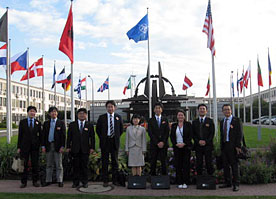Opening the doors for future NATO-Japan cooperation
Michito Tsuruoka believes that fostering relations and understanding between the Alliance and his home country of Japan is vital. A Senior Research Fellow at Japan’s National Institute for Defence Studies in Tokyo, he was part of a group of fellow Japanese academics and think-tankers who recently spent a couple of days at NATO Headquarters discussing issues ranging from increasing partnerships to missile defence with Alliance officials.

“There is much more room for further cooperation between Japan and NATO,” he says. “But we are still at an initial phase and what we have to do first is to understand better what we are doing respectively in areas of mutual concern.”
Helping secure Afghanistan
 As Japanese society has become more accepting of supporting non-combat peacekeeping missions, the country has been working with Allies to secure peace in some of the world’s most volatile regions. Along with contributing more than $3 billion in aid to Afghanistan, Japanese experts bring unparalleled experience of working in difficult areas and are valuable partners in the region. Around 120 development experts are deployed annually in Afghanistan, working on a range of projects including restoration in Bamiyan province and construction of roads and infrastructure in Kabul, Jalalabad and Mazar-e-Sharif.
As Japanese society has become more accepting of supporting non-combat peacekeeping missions, the country has been working with Allies to secure peace in some of the world’s most volatile regions. Along with contributing more than $3 billion in aid to Afghanistan, Japanese experts bring unparalleled experience of working in difficult areas and are valuable partners in the region. Around 120 development experts are deployed annually in Afghanistan, working on a range of projects including restoration in Bamiyan province and construction of roads and infrastructure in Kabul, Jalalabad and Mazar-e-Sharif.
“Afghanistan is not particularly seen as a security problem in Japan among the public. However, at least the government and experts understand that helping to build a stable Afghanistan is in Japan’s strategic interest and this is why Japan supports what NATO is doing there and cooperates where possible,” continues Tsuruoka.
Faced with its own natural disasters and financial problems however, Japanese public opinion might not welcome further international engagement says Taku Ishikawa, Associate Professor in the National Defense Academy’s Department of International Relations.
However, Ishikawa agrees that greater cooperation would strengthen Japan’s political role. “In order to deal with emerging non-traditional threats, Japan increasingly needs wider cooperation. Thus, it is almost structurally ordained that Japan continues its own version of ‘selective engagement’, with a view to lessening the possibility of being abandoned by the United States and generating what is called ‘cumulative deterrence’ effects,” he says.
“Japan should, and probably it will, try to increase the visibility of the Security Defence Force engaging in international cooperation efforts, although dispatches of SDF cannot be so frequent and large in scale due to severe financial constraints and will be limited to non-combat operations only,” Ishikawa adds.
Beyond Afghanistan
Financial limitations and establishing a post-Afghanistan relationship are the challenges for future NATO-Japan relations, explains Tsuruoka. “It is undeniable that the development of NATO-Japan relations has been very much driven by cooperation in Afghanistan,” he explains. “NATO’s main interest over the past several years has been to get troop contributions to ISAF. Now, as NATO looks beyond 2014, it is time to think about partnerships not exclusively based on operational cooperation. What NATO calls Smart Defence offers many interesting possibilities in terms of Japan-NATO interaction and future cooperation.”
Working alongside the Alliance and its partners offers Japan a way to increase interoperability, experience and training. In a world where there are global challenges, such as terrorism, this is increasingly important says Tsuruoka. There is a lot to gain for both sides in the relationship.
“I’ve found that the door is fairly open for NATO-Japan cooperation in various areas,” adds Ishikawa, when discussing what he learnt from the visit to NATO Headquarters. “Although I personally have little influence in policy, I will try to suggest the possibility of cooperation with NATO whenever I get a fit opportunity.”
